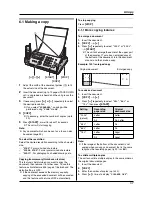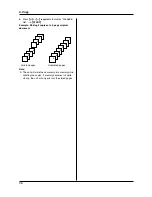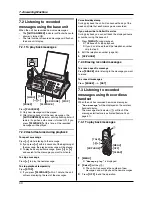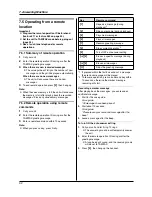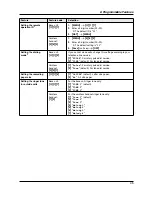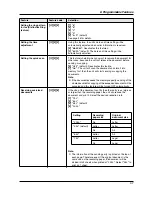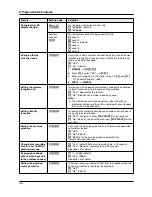
8. Programmable Features
49
Setting flash time
*1
Base unit:
{#}{
7
}{
2
}
The flash time depends on your telephone exchange or host PBX.
{
1
}
“
700ms
”
(default)
{
2
}
“
600ms
”
{
3
}
“
400ms
”
{
4
}
“
300ms
”
{
5
}
“
250ms
”
{
6
}
“
110ms
”
{
7
}
“
100ms
”
{
8
}
“
90ms
”
Note:
L
If the unit is connected via a PBX, this setting may need to be
changed in order for PBX functions (transferring a call, etc.) to
work correctly. Consult your PBX supplier for the correct
setting.
Cordless
handset:
{
0
}{
5
}{
2
}
{
1
}
“
700ms
”
(default)
{
2
}
“
600ms
”
{
3
}
“
400ms
”
{
4
}
“
300ms
”
{
5
}
“
250ms
”
{
6
}
“
110ms
”
{
7
}
“
100ms
”
{
8
}
“
90ms
”
Setting the Caller ID
number auto edit
feature
Base unit:
{#}{
7
}{
5
}
For the base unit auto edit feature only:
{
0
}
“
OFF
”
{
1
}
“
ON
”
(default)
See page 26 for details.
Cordless
handset:
{
0
}{
4
}
For the cordless handset auto edit feature only:
{
0
}
“
Off
”
{
1
}
“
On
”
(default)
See page 26 for details.
Setting the connecting
tone
{#}{
7
}{
6
}
If you often have trouble when sending faxes, this feature allows
you to hear connecting tones: fax tone, ring back tone and busy
tone. You can use those tones to confirm the status of the other
party’s machine.
{
0
}
“
OFF
”
: Deactivates this feature.
{
1
}
“
ON
”
(default): You will hear connecting tones.
Note:
L
If the ring back tone continues, the other party’s machine may
not be a fax machine or may have run out of paper. Check with
the other party.
L
The connecting tone volume cannot be adjusted.
Changing the receiving
mode in the AUTO
ANSWER setting
{#}{
7
}{
7
}
{
1
}
“
TAM/FAX
”
(default): Telephone Answering Machine/Fax
mode (page 34)
{
2
}
“
FAX ONLY
”
: Fax only mode (page 34)
Feature
Feature code
Selection



